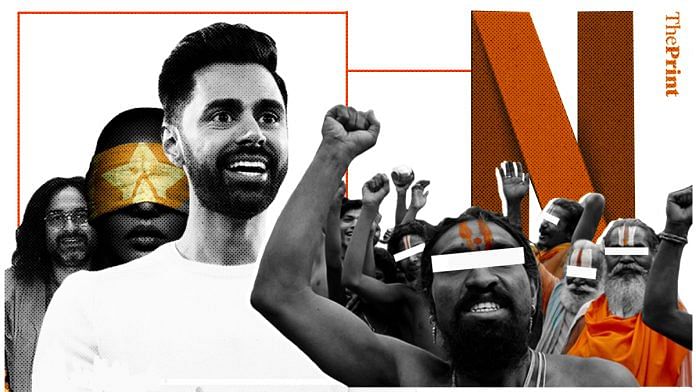Shiv Sena’s IT cell member Ramesh Solanki filed a complaint against Netflix India for “hurting Hindu sentiments” and showing an “incorrect picture of Hindus and India globally” by screening shows like Sacred Games, Leila, Ghoul, Hasan Minaj’s Patriot Act. A group called Hindu Janajagruti Samiti also demanded a ban on Netflix. #BanNetflixInIndia became a top Twitter trend on Friday.
ThePrint asks: Hindu group wants a ban on Netflix: Should streaming platforms be more culture-sensitive?
Many things wrong with transnational media behemoths, but lack of cultural sensitivity is not one of them
 Kaveree Bamzai
Kaveree Bamzai
Senior Journalist
In Turkey, a kiss between two women in Netflix’s animated series Tales of Arcadia got the government so hot under the collar that it announced the streaming services would have to follow the same censorship rules as broadcast TV — no nudity, no alcohol consumption, no smoking, no use of drugs, no gory violence — indeed, no behaviour going “against moral values”.
In Israel, Netflix’s Fauda has enraged Israeli Jews who believe it humanises Palestinian terrorists. In India, we know that the so-called anti-Hindu tilt in series such as Sacred Games and Leila has upset those who believe they are the custodians of the Hindu faith. But all I will say is, may we please have some more?
The more we see the world as it is, the better will be our understanding of the transformations sweeping across the globe. There are many things wrong with transnational media behemoths but lack of cultural sensitivity is not one of them. Imagine if Netflix felt Narcos would offend Colombia with its depiction of the country’s drug trade, or that Germany would find Babylon Berlin’s portrayal of its pre-Nazi, post-World War I depravations and degradations too much to handle. Every age and every nation have their own dimwits, whether it is those who protested against the lesbian kiss in Deepa Mehta’s Fire in 1996 or the flash of Deepika Padukone’s midriff in Padmaavat in 2018.
Global streaming services just give the crazies a global platform.
Web streaming platforms just want to make a quick buck, even at the cost of someone’s sentiments
 Nikhil Hajirnis
Nikhil Hajirnis
Chief Producer, ThePrint
A web series that showcases — with false subtlety — a ‘Hindu’ group and its mastermind weaving a strategy to cleanse the world of humans, another that projects an alternate reality where a ‘Hindu’ majority group vilifies mixed-race couples and throws the protagonist into a correctional home and a show where the host claims that India’s 2019 Lok Sabha elections were conducted specifically to disenfranchise a religious minority points to the fact that Netflix is clearly biased against the Hindu faith. It seems as though today’s web streaming platforms are trying to strike a chord with its viewers by streaming shows that not only present false rhetoric, but are also blasphemous.
Is being culturally insensitive the new norm in the creative community? In my opinion, Netflix seems to be interested in garnering viewership by hurting sentiments of a particular religious community. In fact, Sacred Games goes as far as legitimising the phrase ‘Hindu terror’.
Patriot Act, with its ‘secular’ host Hasan Minhaj, discredited the recently held Lok Sabha elections in India as the world’s largest festival of democracy. He goes on to make claims that the whole exercise involving over a billion people very surreptitiously disenfranchised Muslims. Not only is it factually incorrect, but also outrageous.
Leila, a dystopian drama, is about the protagonist’s search for her daughter in a totalitarian society that is divided on the basis of caste.
Such series brings to light the hypocrisy of web streaming platforms. In the end, they just want to make a quick buck, even if it means doing it at the cost of someone’s sentiments.
Netflix has other shows like The Keepers, The Family and Spotlight that show dark side of Christianity
 Myithili Hazarika
Myithili Hazarika
Assistant Editor, ThePrint
It is true that fiction isn’t far removed from reality or the politics of it, but demands for banning a certain platform or an individual for imaginative liberty shows a serious lack of tolerance.
Outfits demanding a ban on Netflix in India should let viewers decide and analyse for themselves the shows that may or may not have portrayed India and Hinduism in a ‘bad light’. ‘Hinduphobia’ cannot be an adequate justification to dictate how a series is made. If we talk about anti-religion shows and movies on Netflix, there are many others such as The Keepers, The Family and Spotlight that have shown the ‘darker side’ of Christianity.
We need to be more open to ideas that may go against our belief system. It is not necessary that everyone has to agree with us on everything.
The web series Sacred Games, in fact, has several characters drawn from Hindu epics — presented succinctly and with sensitivity — that many millennials may not have otherwise known or heard of.
Similarly, not being able to laugh at things that aren’t considered ‘funny’ can scuttle individual freedoms. Comics like Hasan Minhaj have the ability to make listeners cope with difficult and disruptive issues. Why would there be jokes on 9/11 if people weren’t trying to deal with it through humour?
Selectively banning humour from society can also mean not willing to work through difficult feelings and letting them fester.
Content that lacks cross-cultural sensitivity is either propaganda or devoid of creative resources
 Prashant Dixit
Prashant Dixit
Senior Copy Editor, ThePrint
It is important for content producers — be it of shows, films or advertisements — to be sensitive to cultures. But what exactly does this entail?
Being culture-sensitive means respecting people’s beliefs (provided those are not discriminatory). It also means accepting differences — whether they pertain to gender, class, caste, religion, sexual orientation or anything that a person naturally is or acquires.
Any content put out for public consumption that lacks cross-cultural sensitivities, and is hurtful to those discriminated against, is either propaganda trying to advance a popular stereotype or is devoid of the creative resources necessary for any work of art.
Shows like Leila bother religious zealots because they put out uncomfortable and ugly realities.
Outfits with religious objectives like the Hindu Janajagruti Samiti won’t be outraged as long as the ‘terrorist’ characters are Muslims, villains are Black, gay men act effeminate (and lesbians butch), and realities like casteism, racism and hate crimes are never mentioned. What do these tell you about their ‘sentiments’?
Not that it likely would, but Netflix (or any other platform) shouldn’t pander to such mindless targeting by a specific religious group whose advocates know of only one way to engage with these services: by asking for a complete ban.
Being culturally sensitive to one group will make Netflix culturally insensitive to other communities in India
 Samyak Pandey
Samyak Pandey
Journalist, ThePrint
Netflix has become undoubtedly the world’s single largest OTT giant. India has also been one of the platform’s biggest markets, but this comes with many risks considering the vast social and cultural fault lines in the country. There is an insurmountable amount of pressure on the streaming platform to get bogged down by all this but standing firm against them is what will make Netflix a truly international platform.
Netflix is already culturally sensitive towards India as well as non-English speaking international subscribers, who often prefer local-language programming. The amount and kind of content localisation that Netflix has managed to execute despite being a latecomer to India’s OTT party demonstrates that it not only understands local cultures but also ensures it remains sensitive and responsive to cultural differences in India.
Netflix and other streaming platforms continue to reflect the raw undercurrents in society through their ‘original’ content. Also, trying to be overtly culturally sensitive to one group or idea will make Netflix culturally insensitive to many other communities in India.
Anyone who has problems with Netflix should feel free to file FIRs & let court decide. Banning Netflix? Come on, don’t cry like a child
 Shivam Vij
Shivam Vij
Contributor, ThePrint
Majoritarian extremist groups in India are like toddlers. When a toddler accidentally bumps his or her head against something and gets hurt, adults try to pacify the crying infant by hitting the table. Our radical Hindutva groups and individuals pretend to speak in the name of all Hindus who cry and desire a parental state, by hitting whoever they don’t like. Their first response is to ask for a ban.
They begin with asking for a ban, and forcing the government to find a middle ground — mainly “regulation”. This is how extremist ideas are mainstreamed. The demand for regulation will be to extend the censor board mechanisms to web streaming platforms. A bunch of irrelevant fuddy-duddies will sit and decide which scenes must be cut and so on.
Freedom of speech and expression is a fundamental right, subject to “reasonable restrictions”. In the name of these “reasonable restrictions”, we already have many strong laws against free speech.
Section 298 of the IPC makes punishable words uttered “with deliberate intent to wound the religious feelings…”; section 504 addresses “intentional insult with intent to provoke breach of the peace”; section 153 makes punishable speech acts that lead or could have led to promoting enmity and disruption of harmony; section 295A could land you in jail for up to three years over “deliberate and malicious acts, intended to outrage religious feelings…”; and so on.
Anyone who has any problems with Netflix should feel free to file FIRs and let the courts decide. Banning Netflix? Subjecting web platforms to the censor board? Come on, don’t cry like a child.
By Revathi Krishnan and Taran Deol




Netflix should not be banned at all for their approach or views – its their choice, and presumably india is a free country.
Unfortunately most indians don’t understand the meaning of liberty and freedom.
Try showing something derogatory about Islam and Muslims and then see what they do to Netflix and let’s see what the print has to say about the anti Muslim content. Then the narrative will change drastically and Netflix will be islamophobe and will be destroyed.
Ms maithili , depiction of church in spotlight is true,priests have raped children, so it is justified. but shows based on hinduism are far removed from reality. when did some hindu group tried to bomb europe or a 1984 kind of dystopia was brought into reality? they are morons and you should know better.
Netflix will not dare to stream a show/series that shows Muslims in bad light. But when it comes to Hinduism, anything goes.
That is why Hindus demand ban of Nexflix.
So what you’re saying is that insecure butthurt Hindus like you (who certainly don’t speak for the rest of us) ought to act no better than the Muslims you claim to be superior to? Got it.
GoI should not ban, they should only threaten to ban. Coercion sometimes work better. if they want their next 100 million customers from India, they better mend their ways and stop insulting Hindus
Why does the hindu group bother about what is shown in netflix? If they don’t like it, then just dont watch it. Pretty sure there are hypocrites among them that watches everything what they proclaim as spoiling culture, else how else would they know it. They cant shut their eyes and other things, still they are forced to do because of their rules. Now they are forcing their ridiculous practices to others
The major factor is that these shows are not similar to the tv channel, in the way that the shows are not broadcasted without explicit will. For a channel what they show is all for every consumer, and generally it is not predecided, or a customer can not choose what to watch. In case of netflix it is different. You Pay, then You Click and then You watch, privately. The call to ban and regulate Netflix is regressive, and hurts the sentiment of people who want the right to creative expression. The regressive call to regulate these views is actually attempt to make the opposing ideas cease to exist!!
With India an important market, Netflix would be mindful of local sensitivities, as all multinationals operating in our country are. However, in our interactions with the rest of the world, we should welcome the different perspectives they bring in. No one has empowered a fringe, consisting of people who are not India’s brightest or most learned, to speak or agitate for the rest of us.
Who are the rest of us. If Netflix want to operate in India, they should carry respect for local traditions. Otherwise it should go off.